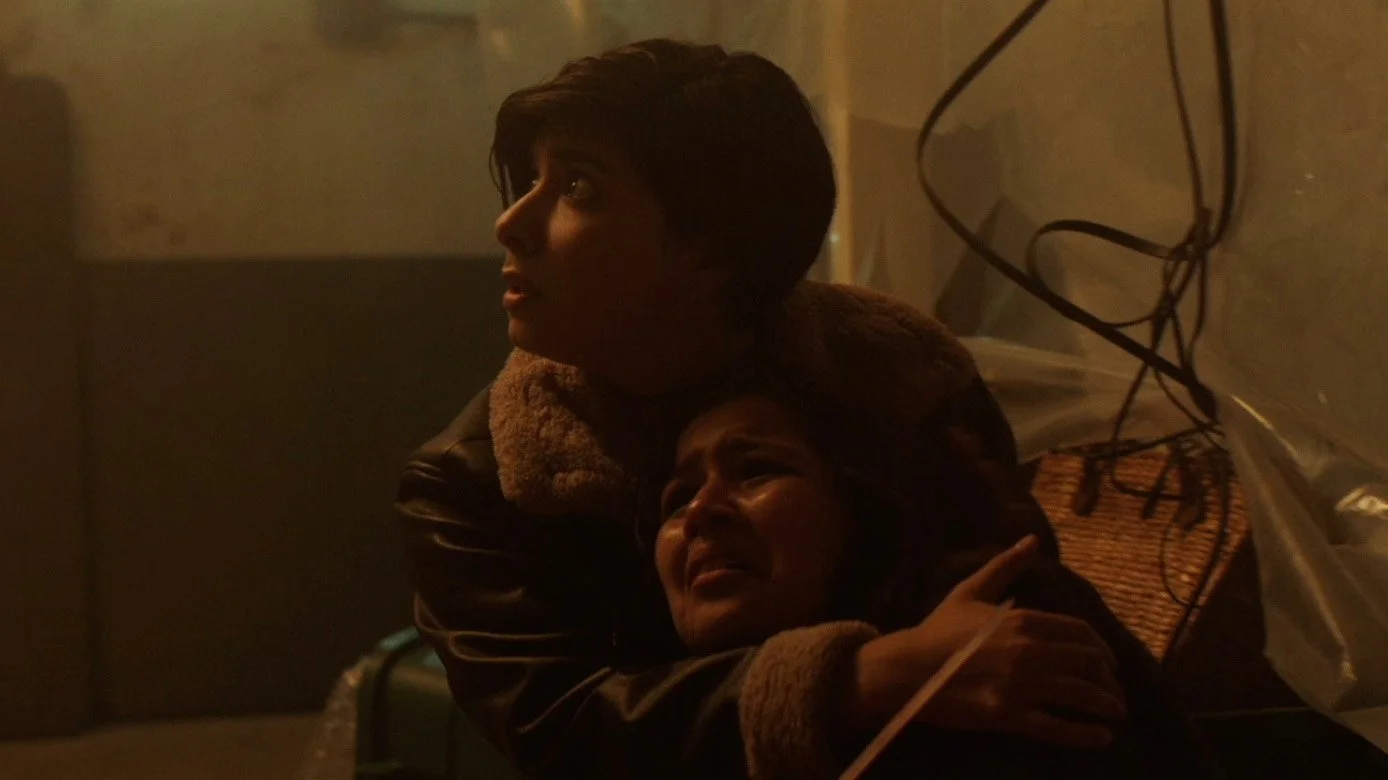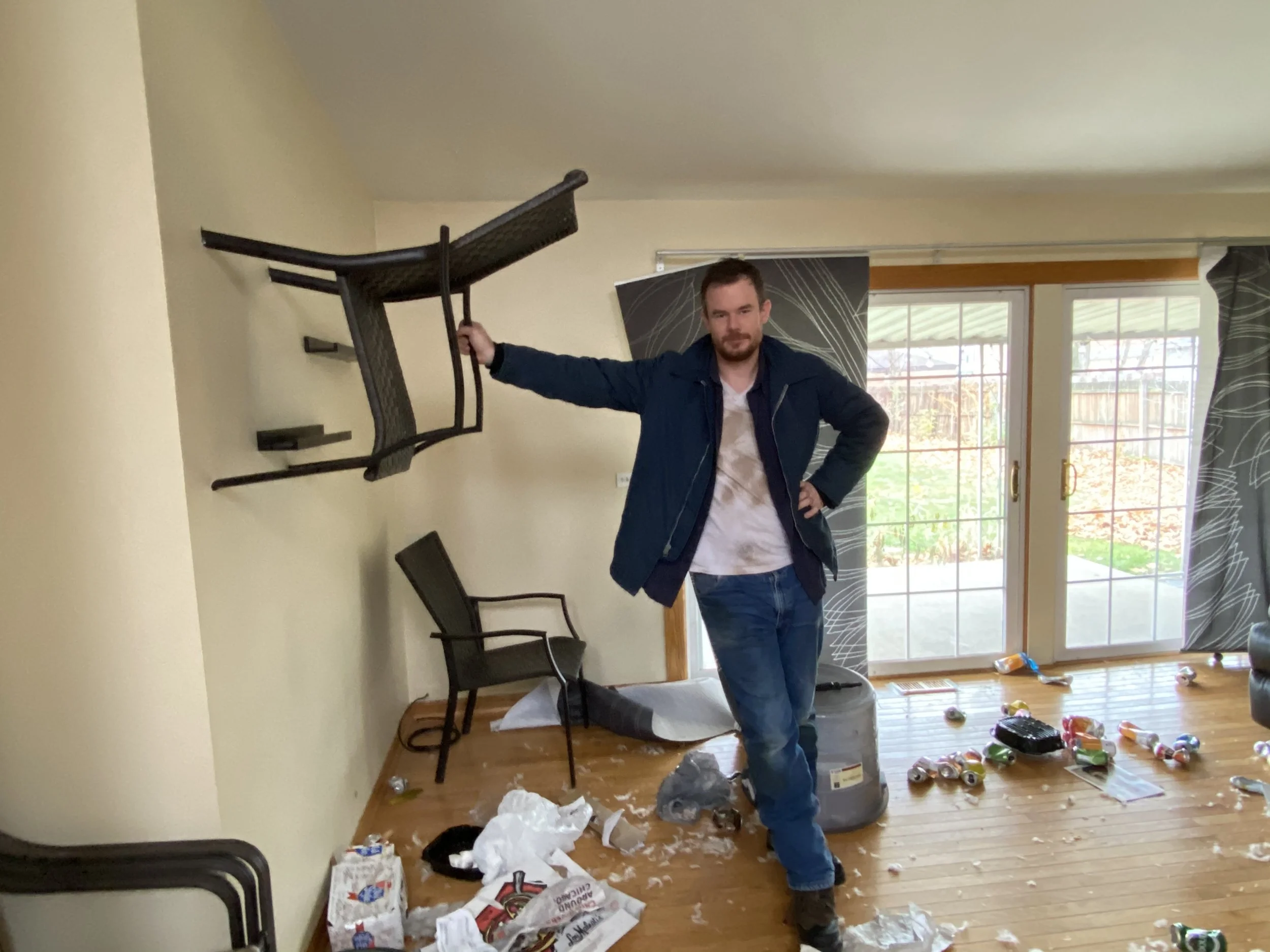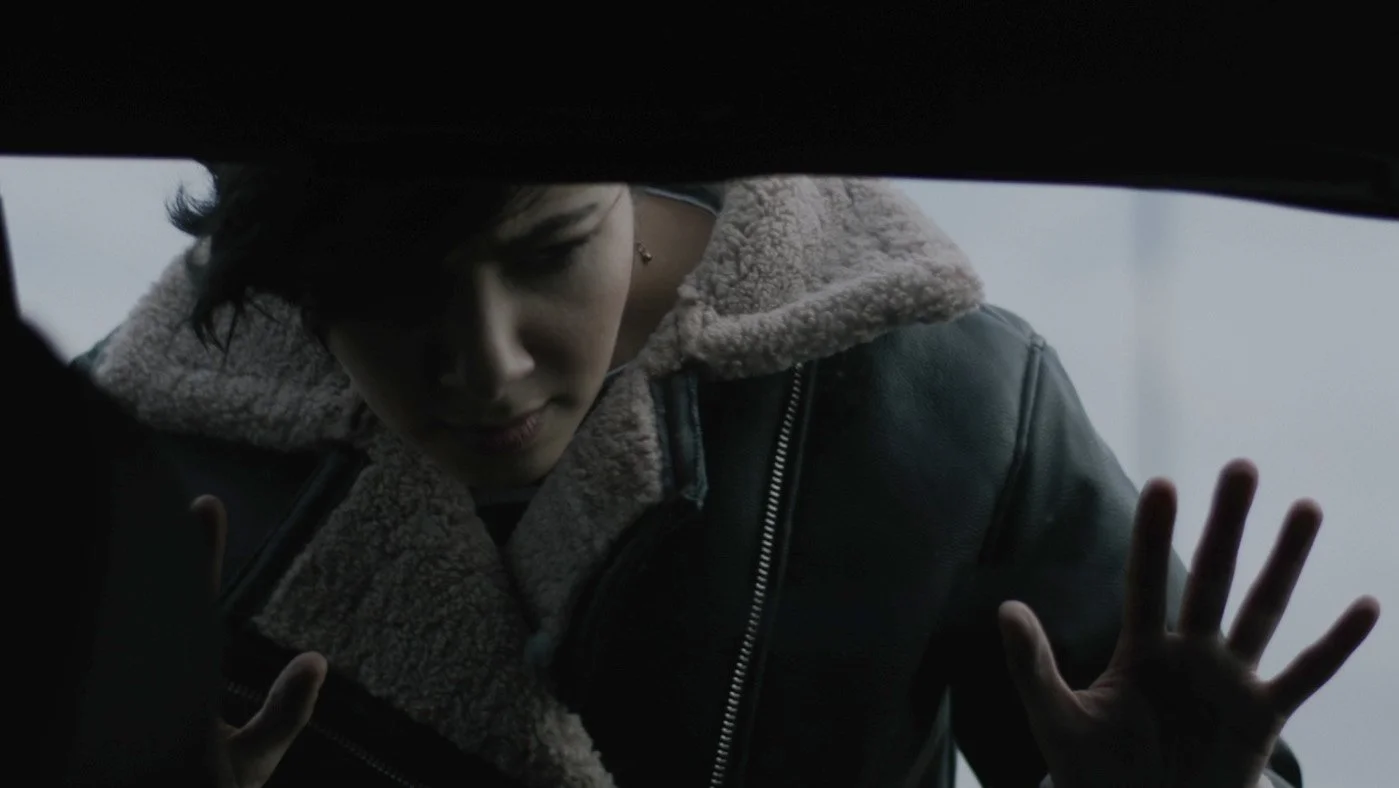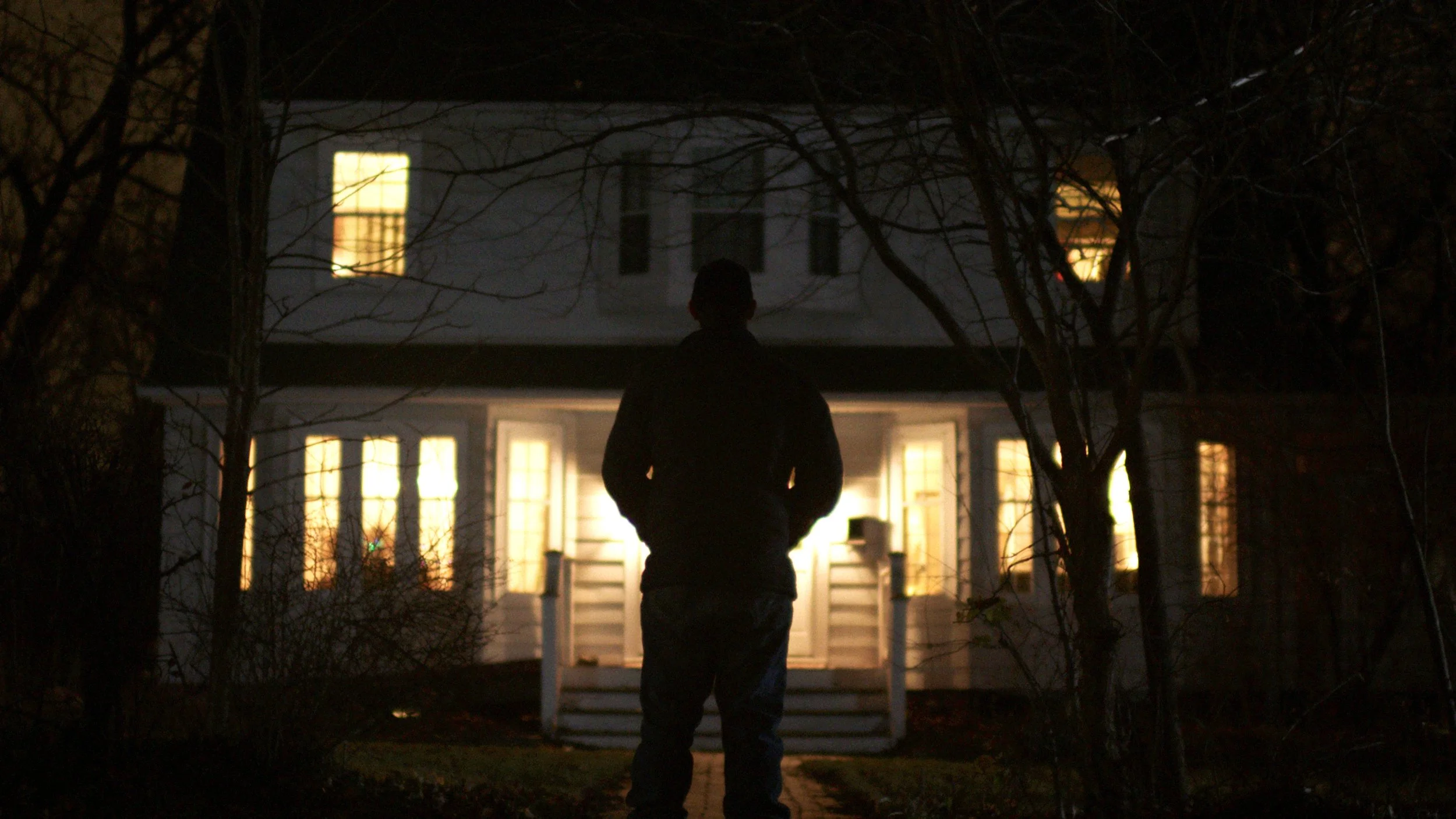IN CONVERSATION WITH JOE SWANBERG
Filmmaker Mickey Keating's, INVADER, which played to a rapt audience at last years FrightFest, is a disquieting home invasion that strips back its narrative to instead offer a random vision of terror in the Chicago suburbs. Joe Swanberg, who stars as Invader, is a primal tour de force, who breaks into homes, and with his violent and destructive rage, transforms them into his own personal hive.
There's a distinct dystopian vibe to INVADER, but Keating and his actor/producer Swanberg distance it from this sub-genre. INVADER is a film that manipulates the audience, luring us into its dark tale, patiently waiting to expose the unrelenting nightmare at its heart.
Swanberg and Keating previously collaborated together on the supernatural horror OFFSEASON (2021), about a couple stuck on a desolate island after the wife receives a mysterious letter luring her back to her childhood home. Swanberg's acting credits include A HORRIBLE WAY TO DIE (2010), YOU'RE NEXT (2012), THE SACRAMENT (2013) and Larry Fessenden's werewolf horror BLACKOUT (2023).
He has also written and directed the werewolf horror SILVER BULLETS (2011) and a segment of the genre anthology V/H/S (2012), titled THE SICK THING THAT HAPPENED TO EMILY WHEN SHE WAS YOUNGER. His other filmmaking credits include CAITLIN PLAYS HERSELF (2011), about a performance artists tumultuous personal relationship, and the comedy-drama DRINKING BUDDIES (2013). He is the creator of the Chicago-set comedy-drama anthology series, EASY (2016-2019), which he directed, wrote and edited, that follows a group of adults navigating life's challenges.
In conversation with GORE IN THE STORE, Swanberg discussed his collaboration with Keating to create a terrifying vision of random horror, and capture a visceral snapshot of fear. He also reflected on the spaces left by the dreamlike quality of cinema and being happy to be a piece on a director's chessboard.
INVADER builds slowly and gets under your skin quietly, to the point when it reaches the suspenseful and violent sequence in the house, it was like a visceral assault.
Joe Swanberg - I love the build of the movie. When Mickey shared the first cut with me, I thought it was fantastic, and by the time they're in the house at the end, he has a 25-minute stretch that's almost flawless.
I worked with him on OFFSEASON, and I just liked him so much as a person and I just felt comfortable with him as a director. I loved watching him work and watching him solve problems. He had a fantastic attitude about the whole process, and I just wanted to do something with him and thought, ‘I wonder if I can get him to come to Chicago? I wonder if I can nudge him?'
I did also wonder what our collaboration would look like, with the kind of tone of the work that I typically do as a producer. Obviously, I want to encourage and support the filmmaker to do their thing, but I thought what if I were an occasional nudging or shaping element towards a kind of realism or something that I would find scary?
I'm a huge horror fan and a big consumer of horror. I'm at the movie theatre a lot watching new horrors, and I'm rarely scared. So, I just had a big question with Mickey going into INVADER, which was the horror conceits and conventions aside, what are the aspects that could actually get under my skin? What would freak me out as a moviegoer? And for me, it's often psychological. And an element of randomness is scary, like something bad could happen to somebody at any time, and there might not be any logic or a moral to it. There might not be a villain who has a code they're operating by, and it might be extremely scary if the villain was operating by no code whatsoever.
So, we started having those conversations and dove into making this project, but I'm glad to hear you say that. I had the same feeling the first time I watched it. I thought, 'Okay, cool, we have gotten to a place where I am actually pretty scared,' which is a nice feeling.
The randomness you're referring to goes back to the first HALLOWEEN, where Laurie and her friends just happened to be in the wrong place, at the wrong time. HALLOWEEN is terrifying because of that randomness, and the way you pitch INVADER conjures up memories of John Carpenter's classic.
JS - Mickey's a cinephile, which makes it really fun to work with him. He's got encyclopaedic movie knowledge, and you can tell he loves movies. And I do too. He's a great person to talk about movies with, and he has a real basis in the roots of classic horror. He also has interesting reference points.
It was fun being in Florida, working on OFFSEASON, and I was surprised by the films he was talking about as inspirations for that one. My encouragement to him with INVADER was that you can't shut all the movies you've seen out of your head. But when we would have conversations, and they would lead back to movies, I often felt like a little bit of a pest because I was kind of nagging him a bit. "Okay, I hear what you're saying. Let's steer this conversation away from reference points and towards our own fear and our own psychology." I do think that is probably what John Carpenter and some of these early filmmakers were doing before horror had such obvious reference points, or as they were inventing the genre.
So, yeah, it felt pure in a way, and it's nice to hear that it's conjuring movies like that. It makes me think that we were maybe tapping into some non-referential or pre-referential points where these filmmakers might have been just asking themselves how they scare the shit out of an audience, and what would terrify them personally? And then, how do they convey that?
It strikes me that the basis of the film and your character is driven by the primal. Also, there's an ALIEN-esque side to the film. Looking at Invader's violent and destructive behaviour, he's actually creating a nest. He has to destroy order and civility because whatever is going on inside of him is so alien to the outside world, that he needs to create chaos.
JS - I had never thought about that, and you're totally right. That is a really wild idea, and it makes me want to watch ALIEN.
Cinema is a shared language and there are only a limited number of archetypal stories. As filmmakers, it's necessary to compromise what's familiar with the pursuit of originality.
JS - For sure, and also, if your guiding light and your love are informed by your experience as a moviegoer, it's impossible to not want to bring that to the table. It's like you're cutting off the passion point. And while I'm working on any movie, the thing that I'm imagining is myself sitting in the movie theatre watching it. All the work is about that moment where somebody is in a dark room seeing the finished movie. Is it working or not? Is it effective or not? Are we communicating or not? So, everything comes back to being a viewer rather than a maker.
For cinephiles, there are few things in life that can rival the experience of watching a film. However, given that a film is a stimulus, it's almost impossible to hold focus, which creates these gaps. So, I personally like to rewatch films multiple times during a theatrical run.
JS - Well, I'm also a multiple viewer. There are probably 20 films that I've gone back and seen multiple times in a movie theatre, and that I would go see again if I heard it was playing in town. I totally relate to that experience, and there's a deepening that happens on second and third viewings.
As a filmmaker, I'm always imagining an ideal audience member who's extremely perceptive, who is paying full attention and is really present. But the thing about the dream quality of cinema is your own head goes off places, even if your eyes are open and you're watching the movie.
It's incredible how many movies I love that I would count among my 50 favourite films of all time, and when I'm rewatching them, I realise I've seen this movie three times, and I have somehow never seen this scene before. And it's because the scene that precedes it is so impactful that I am off reminiscing or fantasising or thinking about something going on in my own life at that time. And even though I'm watching, it's like I have left a space.
So, that part of it is also exciting and rewarding because it's like you're giving yourself a second chance to absorb the film, especially when the initial viewing was so impactful, and when you loved the film. The thing I love about it is it sends me into myself and takes me on an internal voyage while I'm also experiencing a narrative.
I try to go to the movie theatre a couple of times a week if I can, and when I check the movie listings, I am as likely to go see a repertory film as I am to go see a new film.
These gaps can easily become something you obsess over. I suppose it's the desire to pull everything you can from the film, which requires multiple viewings.
JS - I've done it, too. There are a few films that I've seen three days in a row. I go home, and I can't stop thinking about it. I'm like, 'What did I just watch? What was that?' So, I completely relate to this feeling of, 'Okay, this film is going to require another watch. The only way I'm going to get this thing out of my head is to get it back in there again asap.' And that's a huge compliment to the film and the filmmaker. It is an obsessive quality where I'm like, 'Whoa, that thing just blew my mind' or 'I must have missed something.'
I just went again and watched the French film TITANE. I had a really good first watch and I knew I liked it. But, again, it was one of those movies I saw was screening in Chicago at the theatre. I was thinking, 'You know, I have not really gotten that film out of my head since I first saw it. I'm also not sure if I totally grasp what the filmmaker was up to.' It was so cool to see it again, and I can almost guarantee I will see it again in the theatre during my life.
INVADER is likely to be a divisive film and the world we're living in is becoming increasingly fractured. It raises the question, why make this type of film? But you have to admire how Mickey goes all in on the handheld camera and this abrasive and unrelenting style of filmmaking.
JS - Yeah, he has courage like that. Over the course of my own career, I have asked that question that you're asking a lot. I would say my earlier films as a director were purposefully divisive, where I wasn't afraid, or I didn't care about the audience's response.
I've actually changed a little bit, and I think having kids was a part of that change. With going to the movies becoming more expensive and a little bit more of an effort on my end to have to get a babysitter, suddenly it was a big deal to go to the movies. It was not a casual thing like in my 20s where I could just pop off whenever I felt like it.
So, there became a level of respect for the audience in that kind of way, or a trade-off or a mutual relationship. Then, even as a communicator, I reached a point where I was screening a film to a relatively small audience. It was my second or third film in a row that I knew was divisive, and I just asked myself, "Why did you want to do this? What set you on this journey to be a filmmaker?"
I was self-financing my own small movies and I had to reflect deeper. I realised it was about communicating; it was about reaching people and sharing ideas. It was also about being that audience member who's in communion with the film they are watching, as opposed to crossing my arms and being assaulted by the movie.
But then I remember the films that made me want to be a filmmaker were often those assaultive experiences or the experience of leaving the movie theatre, looking at my friends, and going, "Oh my God, that was amazing," and them saying, "What? That sucked. What are you talking about?" Then the two-hour conversation that followed where both sides aggressively argue why it was so great or why it was so terrible.
The communication comes in all different forms. It does not have to be one-to-one communication with the movie you just watched. It could be communicating with your friends and family afterwards, or communicating privately having with yourself.
It's interesting because my own filmmaking has moved in a direction of making more accessible work. It hasn't been compromised; it's just about choosing a story that I felt was not going to purposefully provoke or divide. And yet, as a moviegoer, I noticed that my inclination to go to the movie theatre was much higher when I heard there was a contentious movie screening. I'm the kind of person who wants to jump into the fray and have an opinion on something divisive.
So, it was cool to talk about INVADER and there's something pure about Mickey's filmmaking. It's not that he's an inflexible person, he's actually quite flexible and quite realistic. It's what drew me to him, and I wanted to work with him more after OFFSEASON because he has a good head on his shoulders. He understands production, he understands the realities, the give and the take of it. So, it's just really nice to work with somebody who knows what they are up to on a film, and who are not going to do a halfway version of it.
In the case of INVADER'S camera work, his relationship with Mac, the director of photography who he has worked with a lot, gave them both mutual trust to go for it. As a producer, there's an instinct to temper this and imagine the potential divisiveness, and on the other hand, whether you should support it?
With a filmmaker like Mickey, you have to support it. His track record and his attitude speak for itself. He's walking down this path, and he understands this is not a choice for everybody. I'm really glad we did it, and I've never felt bad as a producer trusting the filmmaker. It's what I would want as a director from my producer, and it's easy to give it from the other side.
Mickey is the type of storyteller that is driven by moments, and how one bleeds into the next. Are you the type of storyteller and actor that likes to improvise and be in the moment?
JS - It's funny, I started acting after I began directing, or at least bigger roles in other people's movies came after I had made a few of my own features. So, I went into acting, imagining myself as a director who was going to go act in my friend's film.
My attitude on set early on was very much how do I help you to realise your vision? I had my own movies, and so I didn't need the acting role as a creative outlet for myself — I'd already found one. So, I'm there to make your movie the best version you want it to be. "Direct me, give me line readings, tell me to stand somewhere. I'm here for you." There was no ego.
I feel the same way with Mickey and INVADER, and I continue to bring that attitude to projects. I'm obviously going to advocate for ideas if I believe in them or push back if I think something doesn't make sense to me. But as long as it makes sense or is within the realm of making sense, I'm like a piece on Mickey's chessboard, as opposed to my own. Mickey is a very confident and good director in that way. It was a great collaboration and a lot of fun.
From a producing standpoint, because I'm not the lead of the film, I was able to be an omniscient producer for him and then also was able to become an actor when it was time to go do that. He was very responsive to my continued push to know who that character was.
He and I talked about it, and I said, "The scariest version of this character is someone who no longer has a game plan. He has reached the point where he expects to eventually be caught. He's not masterminding some grand scheme. He doesn't have a play that he has reserved in his back pocket to get out of a situation. He's like an animal that has been cornered and is now going to fight to the death."
To me, that's terrifying and a really scary place for any of his victims, because you just look at him, and you realise this is not a logical person. This is a frightened creature who's now in survival mode and does not care anymore, even about himself.
Mickey got that, and those were the kind of director and actor questions we'd ask before we would shoot a scene, because I didn't want him to feel like he's Jason Bourne, who has gotten himself into a pickle, and has the wits and the smarts to get himself out of it. No, I wanted him to be a coyote with several animal control people surrounding him, who's gonna bite, claw, scratch, kick, and try and get through their legs — a total fear impulse. So, we were just ratcheting that up in our conversations and making sure that however we shot a scene, it contained that kind of energy.
Paul Risker
INVADER is now available On Digital in the US from Music Box Films.





